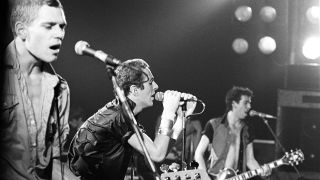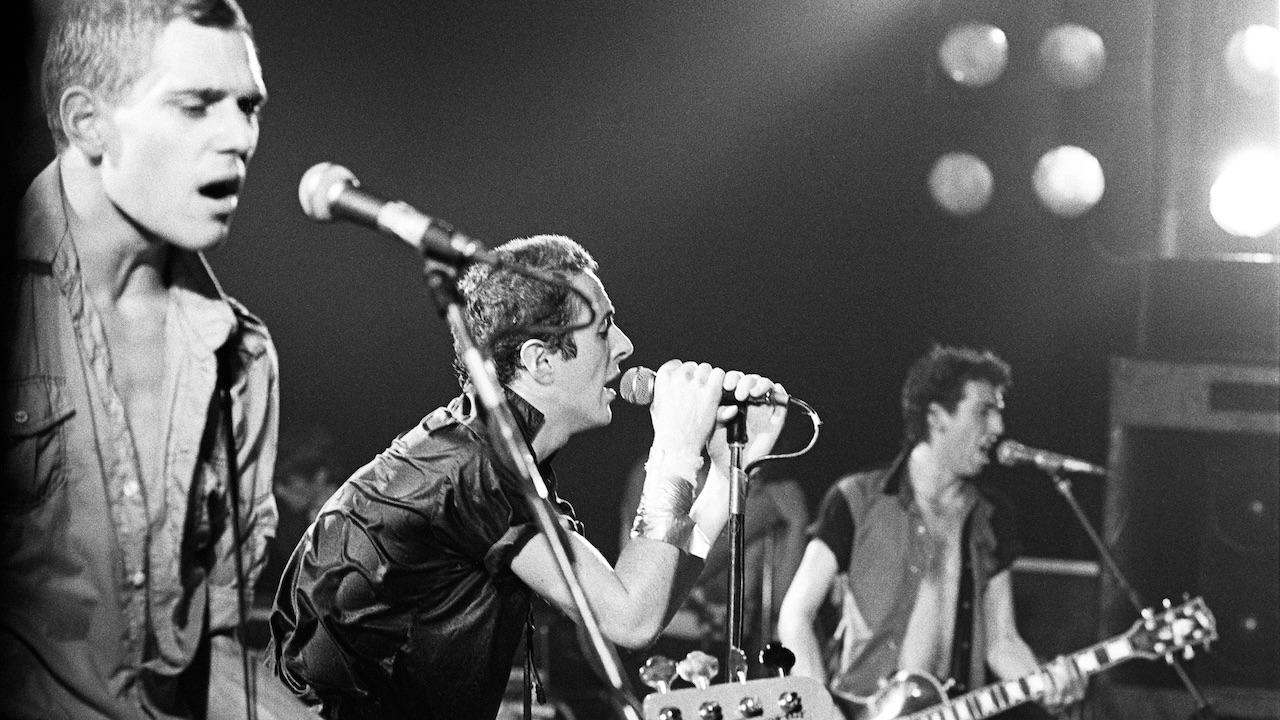“The chief of police came up to me in the cell and went, Is this the Englander who’s accused of beating up punks? Then he bent down and said, Good for you, mate.” Joe Strummer on the night a Clash gig turned into a bloody band versus audience riot

In 1977, on The Clash’s debut single, White Riot, vocalist/guitarist Joe Strummer sang about wanting “a riot of my own” . He wouldn’t have to wait terribly long to get one. In fact, before the year was out, the 11th hour cancellation of his band’s scheduled debut Belfast gig, on the aptly-titled Out Of Control tour, resulted in punks facing off in the streets against the Royal Ulster Constabulary.
This skirmish, however, was nothing compared to the violence the band would encounter two-and-a-half years later while performing in Hamburg, West Germany.
“The first time we went there this guy was undoing my Doc Martens all night as we played, Strummer recalled in a 1988 interview with Musician magazine. “About the fifth time I said, The next time you touch it I’ll do you, ’cause I’m trying to sing.’ He touched me again, so I kicked him in the head. After the show I was in the washroom and he was washing blood off his face.”
When The Clash returned to the city on May 5, 1980, to play a sold-out show at the Markthalle venue, punks outside the venue were already involved in running battles with the local police. In Marcus Gray’s Clash biography Return Of The Last Gang In Town, Adrian Whittaker, an English Clash fan living in the city, explained that Hamburg’s anarcho-punk squat community were in constant conflict with the authorities, and they had attempted to crash into the gig for free, to berate the band for “selling out” their punk principles.
“They tried to get in free, couldn’t, sat down in the main road outside, and brought traffic to a standstill,” Whittaker said. “They got cleared away by riot police, and, tempers fraying, besieged the doors again.”
A decision was taken to allow the gatecrashers in, in an attempt to defuse the situation, and ward off violence, but the punks were still not satisfied. Individuals kept storming the stage, grabbing the mics, and berating the London band for various perceived ‘betrayals’.
“We were seen as worse than the Eagles stylistically,” Strummer told Musician. “They said, ‘Right, we’ll turn up and give ’em a good kicking. ’ We let ’em in the gig and then it was either have a pitched battle or attempt to play the set. In the end we had to get down and slug it out with them.”
On the audio recording of the gig, ironically, during an extremely ragged version of I Fought The Law, you can hear Strummer get into an altercation with one ‘fan’.
“I was playing and I saw this guy, sort of using the guy in front of him as a punch-bag, trying to be all tough,” Strummer later explained to NME. “So I rapped him on the head with a Telecaster, I just lost my temper. And there was blood gushing down in front of his face. It wasn’t much of a cut, but it looked a real horror show. And the howl out of the audience – you shoulda heard it.”
Before playing the next song on the set-list, White Man in Hammersmith Palais, Mick Jones quoted the lyric “You think it’s funny, turning rebellion into money”, and told the crowd, “We’re not here for money, we’re here to play”, and offered to refund the price of admission to the most unruly crowd members, a very generous offer bearing in mind that they hadn’t actually paid to get in. His offer was applauded, but the heckling and violence continued. Before long, the venue turned into a pitched battle between the band and their most vocal opponents.
“It was like being a professional wrestler,” Strummer told Musician. “The band and crew got down on the dance floor with the punks and started to battle en masse. Meanwhile the innocent burghers of Hamburg were standing around the edges on little raised tiers, still watching. As the fight was going on I was thinking, This is ridiculous! One minute you’re in a band and the next you’re slugging it out. It seemed to make no difference to the people watching! I looked up and saw them standing there with the same expressions on their faces. I remember thinking, God! Where will this end?”
The police, inevitably, were summoned once more.
43 years ago todayAssaults, fisticuffs and riots on and off the stageThe Clash, Hamburg Market Hall, May 19, 1980.#punk #punks #punkrock #theclash #history #punkrockhistory #otd pic.twitter.com/ewm5J0eYTvMay 19, 2023
With a laugh, Strummer explained to Musician what happened next.
“While I was waiting to be arrested this giant came backstage and said, ‘You! You are ze one who kicked my face! This time you don’t get away with it! You started that riot! I’m gonna tell the cops!’ I went, Oh my fucking hell! It’s you!”
“Luckily I was stone cold sober when they arrested me,” Strummer continued. “The chief of police came up to me in the cell and went, ‘Is this the Englander who’s accused of beating up punks?’ They went, ‘Yeah. ’ He came over to me and bent down and said, ‘Good for you, mate.’ Then he straightened up and walked away.”
“I began to think that I’d overstepped my mark,” Strummer admitted to NME. “I became very frightened that violence had really taken me over. So since then I’ve decided the only way you can fight aggro in the audience is to play a really boring song.”
Listen to the mayhem unfold during the gig recording below:

